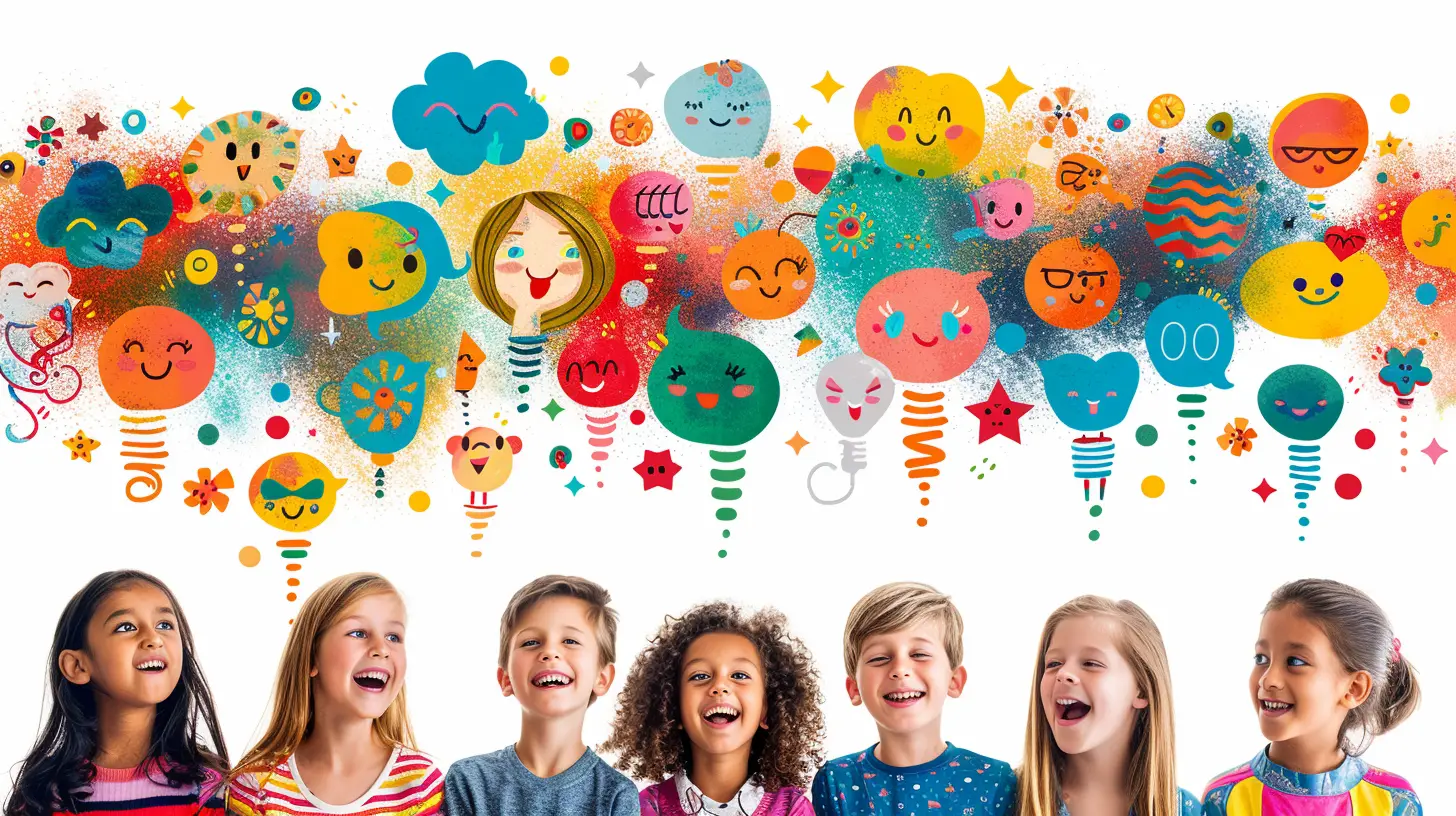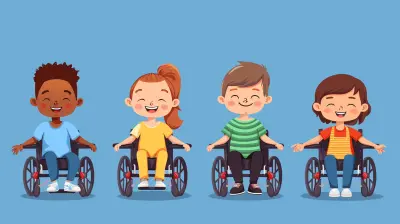How Bilingualism Boosts Academic Achievement
22 December 2024
In today’s increasingly globalized world, the ability to speak more than one language is no longer just a cool party trick—it’s a serious advantage. But did you know that being bilingual doesn’t just help you navigate different cultures and countries? It can also give you a significant boost academically. That’s right! Bilingualism, the ability to speak and understand two languages fluently, has been shown to improve everything from cognitive skills to academic performance.
In this blog post, we’re going to dive into how bilingualism boosts academic achievement and why learning a second language could be one of the best decisions you ever make for your education. So grab a coffee (or a hot chocolate), and let's explore how bilingualism can open doors to academic success.

What Is Bilingualism?
Before we dive into the nuts and bolts of how bilingualism impacts academic achievement, let’s first clear up what we mean by "bilingualism." At its core, bilingualism simply refers to the ability to speak and understand two languages fluently. You don’t have to be perfect in both languages to be considered bilingual, but you should be able to communicate effectively in each.There are different types of bilingualism as well:
- Simultaneous Bilingualism: This happens when someone grows up learning two languages from birth.
- Sequential Bilingualism: This refers to someone who learns one language first and then becomes fluent in another later in life.
Regardless of when or how you learn a second language, the benefits of bilingualism in academic settings apply across the board.

Why Does Bilingualism Matter in Education?
You might be wondering, "How does knowing two languages actually help me in school?" Good question! The academic benefits of bilingualism are rooted in the way the brain processes and handles multiple languages. Being bilingual isn’t just about memorizing words in a foreign language—it’s about training your brain to think differently.When you speak more than one language, your brain has to constantly switch between languages, which strengthens your cognitive flexibility and problem-solving skills. It’s like giving your brain a workout at the mental gym! These strengthened cognitive skills often translate into improved performance in academic settings.
Cognitive Benefits of Bilingualism
One of the most well-documented benefits of bilingualism is the positive impact it has on cognitive development. Think of it as a superpower for your brain! Here’s how it works:1. Enhanced Executive Functioning: Executive functions are the mental processes that enable us to plan, focus attention, remember instructions, and juggle multiple tasks. Bilingual people often show superior executive functioning compared to monolinguals, meaning they’re better at things like multitasking and problem-solving.
2. Improved Memory: Learning and using two languages regularly is like doing mental gymnastics. It keeps your brain sharp and improves both your short-term and long-term memory. This can be especially helpful when you’re trying to remember facts for exams or presentations.
3. Greater Cognitive Flexibility: When you switch between languages, you’re not just switching words—you’re switching grammar rules, sentence structures, and even cultural contexts. This constant mental juggling makes bilingual individuals more flexible thinkers, which can come in handy when dealing with complex academic concepts.
4. Better Focus and Attention Control: Bilingual individuals are often better at filtering out unnecessary information and focusing on the task at hand. This is because they’re used to ignoring distractions in one language while focusing on the other. In a school setting, this can mean better concentration during lectures and fewer distractions while studying.
Language Skills and Academic Performance
Now that we’ve covered the cognitive benefits, let’s talk about how bilingualism directly impacts academic performance.Enhanced Reading and Writing Skills
One of the most significant academic advantages of being bilingual is the ability to transfer language skills from one language to another. When you learn the grammar, sentence structure, and vocabulary of a second language, you often gain a deeper understanding of your native language as well. This can lead to improved reading and writing abilities in both languages.For example, bilingual students often perform better on reading comprehension tests, not just in their second language but also in their native one. Why? Because they’re used to analyzing sentences and understanding complex texts in two languages, which strengthens their overall literacy skills.
Improved Problem-Solving Abilities
Learning a second language requires you to think outside the box. You’re constantly figuring out how to express ideas in different ways, especially when you don’t know the exact translation of a word. This creative thinking spills over into other academic areas, particularly in subjects like math and science, where problem-solving is crucial.Bilingual students often show better problem-solving skills, creativity, and critical thinking abilities. These skills are essential for tackling academic challenges and can lead to higher grades and better performance in subjects that require logical reasoning.
Higher Standardized Test Scores
Here’s where things get really interesting. Studies have shown that bilingual students tend to perform better on standardized tests compared to their monolingual peers. This is especially true for tests that measure verbal and mathematical reasoning, such as the SAT or GRE. The improved cognitive flexibility, focus, and memory skills developed through bilingualism can give students an edge when it comes to test-taking.Social and Emotional Benefits of Bilingualism in School
It’s not all about the brain, though. Bilingualism also comes with a host of social and emotional benefits that can positively impact academic achievement.Greater Cultural Awareness
When you learn a second language, you’re not just learning new words—you’re also learning about different cultures. This cultural awareness can make you more open-minded and empathetic, which can enhance your social interactions in school. Being able to communicate in more than one language also means you can build relationships with a more diverse group of people, which can lead to a richer social life and a broader network of friends.Increased Confidence
Learning a second language is no small feat! The process of mastering a new language can be challenging, but it’s also incredibly rewarding. As you improve your language skills, you’ll likely feel a boost in your confidence. This newfound self-assurance can carry over into other areas of your academic life, making you more willing to participate in class discussions, join extracurricular activities, and take on new challenges.Better Adaptability
Bilingual individuals are often more adaptable than their monolingual peers. This is because they’re used to navigating different languages, cultures, and social contexts. In an academic setting, this adaptability can help students adjust to new teachers, subjects, and learning environments more easily.
Long-Term Academic and Career Advantages
The benefits of bilingualism don’t stop once you graduate from school. In fact, being bilingual can give you a serious advantage in the job market. Employers are increasingly looking for candidates who can speak more than one language, especially in fields like education, healthcare, and international business.But here’s the kicker: bilingualism also makes you a lifelong learner. The skills you develop by learning a second language—like problem-solving, cognitive flexibility, and adaptability—will continue to serve you well throughout your academic and professional life.

How to Encourage Bilingualism in Education
So, how can we encourage bilingualism in today’s educational systems? Here are a few strategies that can help foster bilingualism and reap its academic benefits:1. Dual Language Programs: Schools can offer dual language programs where students receive instruction in two languages. This helps students develop fluency in both languages while still mastering other subjects like math and science.
2. Language Immersion: Schools can create opportunities for language immersion, where students are encouraged to speak and use a second language in everyday situations. This could be through foreign exchange programs, bilingual clubs, or even study abroad opportunities.
3. Supportive Home Environment: Parents can play a significant role in encouraging bilingualism by speaking a second language at home or enrolling their children in language classes.
4. Use of Technology: With the advent of language learning apps like Duolingo, Memrise, and Babbel, students can practice their language skills in fun and engaging ways outside the classroom.
Final Thoughts
Bilingualism isn’t just about speaking two languages—it’s about unlocking a world of cognitive, academic, and social benefits. From improved problem-solving skills to higher test scores, being bilingual can give you a serious edge in school and beyond. So whether you’re already bilingual or thinking about learning a second language, know that the effort you put in will pay off in more ways than one.So, what are you waiting for? Grab that Spanish textbook, sign up for French classes, or download a language app today. Your brain—and your academic future—will thank you!
all images in this post were generated using AI tools
Category:
Bilingual EducationAuthor:

Monica O`Neal
Discussion
rate this article
18 comments
Juliet McKinstry
Great insights! Bilingualism not only enhances cognitive skills but also expands cultural understanding, which is crucial in today's globalized world. Encouraging multilingual education can significantly benefit students' overall academic performance and personal growth.
April 7, 2025 at 4:34 AM

Monica O`Neal
Thank you! I completely agree—bilingualism indeed enriches both cognitive development and cultural awareness, making it vital for education in our interconnected world.
Tank Jackson
This article piques my curiosity! How exactly does bilingualism enhance cognitive skills? I’m eager to learn more about its impact on critical thinking and problem-solving abilities.
March 26, 2025 at 4:31 AM

Monica O`Neal
Bilingualism enhances cognitive skills by promoting greater mental flexibility, improving memory, and enhancing critical thinking. It trains the brain to switch between tasks and perspectives, which in turn sharpens problem-solving abilities. This cognitive flexibility is linked to better academic performance.
Landon Cantu
This article compellingly highlights the cognitive advantages of bilingualism and its positive impact on academic performance. Emphasizing critical thinking and adaptability, it presents a strong case for promoting language learning in education.
February 12, 2025 at 12:50 PM

Monica O`Neal
Thank you for your insights! I'm glad you found the connection between bilingualism, critical thinking, and academic success compelling. Promoting language learning truly can enrich education.
Elena McKibben
Bilingualism: the magical puzzle piece in the academic jigsaw! Imagine your brain hosting a party where languages mingle, ideas dance, and creativity takes the spotlight. So, grab your multilingual confetti and prepare for a learning fiesta—because who knew that speaking two tongues could unlock a treasure trove of brainpower? 🎉📚✨
February 1, 2025 at 9:24 PM

Monica O`Neal
Absolutely! Bilingualism truly enhances cognitive flexibility and creativity, making it a powerful tool for academic success. Let the learning fiesta begin! 🎉
Misty Lee
Learning two languages? It's like having a secret superpower! Suddenly, algebra feels less like math and more like a code to crack. Who knew bilingualism came with an academic cape?
January 28, 2025 at 11:41 AM

Monica O`Neal
Absolutely! Bilingualism not only enhances cognitive skills but also transforms learning into an exciting challenge, much like cracking a code. It truly is an academic superpower!
Lulu McElhinney
Bilingualism enhances cognitive flexibility, improves problem-solving skills, and fosters cultural awareness, significantly contributing to academic success across disciplines.
January 21, 2025 at 4:32 AM

Monica O`Neal
Thank you for your insightful comment! I completely agree that bilingualism not only enhances cognitive abilities but also enriches cultural understanding, all of which play a crucial role in academic success.
Claire McLaughlin
Thank you for this insightful article! It beautifully highlights the significant advantages of bilingualism in academic settings. Understanding how language skills correlate with cognitive development is crucial for educators and parents alike, promoting a more inclusive learning environment for all students.
January 13, 2025 at 5:21 AM

Monica O`Neal
Thank you for your thoughtful comment! I'm glad you found the article insightful and valuable for promoting bilingualism in education.
Runevale McTigue
Two tongues weave wisdom; knowledge blooms beautifully bright.
January 7, 2025 at 12:20 PM

Monica O`Neal
Thank you! Bilingualism indeed enriches learning and fosters diverse perspectives.
Yazmin Hines
Great insights, thank you!
January 4, 2025 at 11:31 AM

Monica O`Neal
Thank you for your kind words! I'm glad you found the article insightful.
Sylas McMahon
Bilingualism not only enhances cognitive flexibility but also improves problem-solving skills, leading to increased academic achievement. Embracing multiple languages can significantly enrich educational experiences for students.
January 1, 2025 at 8:19 PM

Monica O`Neal
Thank you for highlighting the benefits of bilingualism! Indeed, its impact on cognitive flexibility and problem-solving skills is vital for academic success. Embracing multiple languages truly enriches students' educational journeys.
Archer Jackson
This article presents compelling insights into the positive impact of bilingualism on academic performance. The evidence shared highlights the cognitive advantages and enhanced problem-solving skills that bilingual individuals possess. Such perspectives are invaluable for educators and parents alike, fostering a greater appreciation for language diversity in educational settings.
December 30, 2024 at 3:17 AM

Monica O`Neal
Thank you for your thoughtful comment! I'm glad you found the insights on bilingualism's positive effects on academic performance valuable. Encouraging language diversity is indeed crucial for fostering cognitive growth in students.
Felix Wade
Who knew that speaking two languages could be the secret sauce for academic success? It’s like having a cheat code for your brain! So, whether you’re conjugating verbs or mastering vocab, remember: bilingualism isn’t just a party trick; it’s your ticket to A+ grades!
December 27, 2024 at 9:32 PM

Monica O`Neal
Absolutely! Bilingualism enhances cognitive skills, improves problem-solving, and increases cultural awareness, all of which contribute to better academic performance. It's definitely more than just a party trick!
Petra Patel
Bilingualism opens doors to learning! Excited to see how it enhances academic success for students everywhere!
December 27, 2024 at 2:00 PM

Monica O`Neal
Thank you! Bilingualism indeed fosters academic success by enhancing cognitive flexibility and cultural understanding. Excited to share these insights!
Alisha Bell
Bilingualism isn't just a skill; it's an academic superpower that unlocks cognitive potential and boosts achievements!
December 27, 2024 at 3:54 AM

Monica O`Neal
Thank you for highlighting the transformative impact of bilingualism! It truly enhances cognitive abilities and opens up new pathways for academic success.
Thorne McMeekin
Being bilingual: the ultimate academic superpower in today’s classrooms!
December 26, 2024 at 4:11 AM

Monica O`Neal
Absolutely! Bilingualism enhances cognitive flexibility, improves problem-solving skills, and fosters better communication, all of which contribute to academic success.
Kenzie Stewart
Bilingualism truly enriches learning; it fosters connections and enhances critical thinking in students.
December 25, 2024 at 8:18 PM

Monica O`Neal
Thank you for your insightful comment! I wholeheartedly agree—bilingualism not only enriches learning experiences but also promotes deeper connections and critical thinking skills essential for academic success.
Karson McClure
Embrace bilingualism! It’s like giving your brain a workout while boosting academic success. Keep shining! 🌟
December 25, 2024 at 1:53 PM

Monica O`Neal
Thank you! Bilingualism indeed enriches cognitive skills and enhances academic performance. Appreciate your support! 🌟
Valeris Wheeler
Bilingualism enhances cognitive skills, improves problem-solving abilities, and fosters cultural awareness, significantly boosting overall academic achievement.
December 23, 2024 at 11:45 AM

Monica O`Neal
Thank you for your comment! Indeed, bilingualism offers numerous cognitive and cultural benefits that contribute positively to academic success.
MORE POSTS

Learning New Skills in a Changing Economy Through Continuing Education

Guide to Early Action and Early Decision: Is It Right for You?

How to Help Visual Learners Stay Organized

The Role of Data Privacy in Shaping Future Education Policies

Using Peer Mentors to Support Students with Special Needs

Collaborative Problem Solving: Strategies for the Classroom

How to Spot Misinformation Online: A Guide for Young Learners

How Project-Based Learning Improves Problem-Solving Abilities

The Impact of STEM Education on Future Career Opportunities

Understanding College Admissions Trends: What’s Changing?

How to Stay Motivated During Long Online Semesters